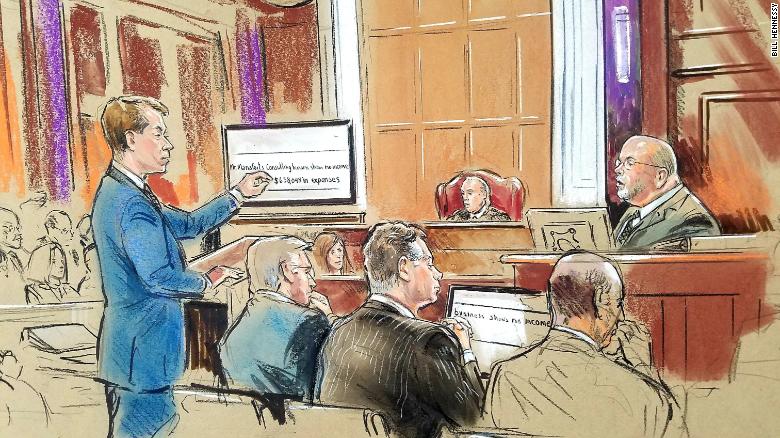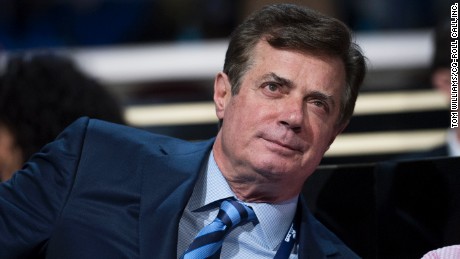(CNN)The prosecution in the trial of former Trump campaign chairman Paul Manafort rested Monday after filling up 10 days with 27 witnesses.
Here are five takeaways:
Final testimony
Prosecutors tied up the loose ends of their case on Monday, calling the last banker to testify and asking a financial fraud federal agent to return to the witness box. The banker, James Brennan of Federal Savings Bank, put the finishing touches on how his bank's founder and chairman, Stephen Calk, assisted in Manafort's fraud by pushing $16 million in loans the bank knew were too risky to give.
The bank knew and documented the financial red flags that came with Manafort's loan applications -- from hidden debt to shaky professional income. Brennan even rated one loan for Manafort risky but doable in a memorandum used by regulators and the bank. He said on the stand Monday he would never have given that rating if Calk hadn't pressured him. Calk sought a top role in the Trump campaign and administration at the time the bank approved the loans, another witness testified.
"If I had my recommendation ... the loan would not be made," Brennan said. He gave it the sham rating "because the loan was going through," he added.
Prosecution rests
If that didn't give enough clarity to prosecutors' allegations, one last five-question exchange might have. Prosecutors won Judge T.S. Ellis' permission to call back a financial fraud agent with the enforcement agency FinCEN to speak about Manafort's foreign banking charges. The witness, Paula Liss, testified that not only hadn't Manafort himself disclosed to the agency the existence of his foreign accounts, but neither did his consulting company, which brought in millions of dollars for Ukrainian lobbying. She spoke directly to the question of whether Manafort knew he needed to disclose to the federal government his foreign bank accounts.
With little fanfare following Liss' final answers, prosecutor Greg Andres stood up to say the prosecution was done.
Calk's list of 'rolls'
One of Calk's dream jobs was running the Pentagon.
The Justice Department released emails from Calk to Manafort where the banker made his case for a Trump administration job -- including secretary of defense.
The list of "Perspective Rolls (sic)," as Calk wrote, also included the top jobs at Treasury, Commerce and Housing and Urban Development.
Calk also listed 19 potential ambassadorships. He declared himself for the United Kingdom job as "most qualified as I grew up in London."
Also on the list: France, Germany, Italy, Spain, Japan, Ireland, Australia, China, United Nations, NATO, European Union, Portugal, Holy See, Luxembourg, Austria, Switzerland, Netherlands and Singapore.
Manafort defense hopes some charges may be dismissed
Manafort's defense attorneys formally asked the court to dismiss the case, a type of request that typically happens at the end of a prosecution's presentation and is usually quickly set aside by the trial judge.
But the defense team thinks it has an extra leg up on dismissing the four Federal Savings Bank fraud charges because Ellis previously suggested in court that the bank couldn't be defrauded if Calk wanted Manafort to have the loans.
"We believe there's not been a showing of materiality as to those counts, that the bank -- the evidence suggests that the bank did not rely on any representations made by Mr. Manafort in granting those loans, and at this time, it would be appropriate to dismiss those counts," defense attorney Richard Westling said in court Monday evening.
Ellis appears set to rule on these final requests Tuesday when court reconvenes at 9:30 a.m. ET.
Will Manafort testify? What's next
Now, the big question is what Manafort's defense team will do. Will it present a case and call witnesses? Will Manafort testify in his own defense? Or will his defense team do nothing, effectively rolling the dice on its efforts to cut down the prosecution witnesses' testimony over the past two weeks?
It would be surprising if Manafort testified. He'd open himself up to cross-examination by the prosecutors, who've presented reams of evidence against him, and anything he says in court could be used against him in September, when his second criminal trial for foreign lobbying violations is set to begin.
Both the prosecutors and the defense team say they want two hours each to make their closing arguments.
"I think that's within the outer envelopes of reasonable. So I'll permit two hours, but I tell you, it's no accident that TV programs are half an hour," Ellis told them on Friday, continuing his active presence in the courtroom.
Then, once both sides have rested, the court will determine the instructions they give to a jury. And the jury will start its work.






















